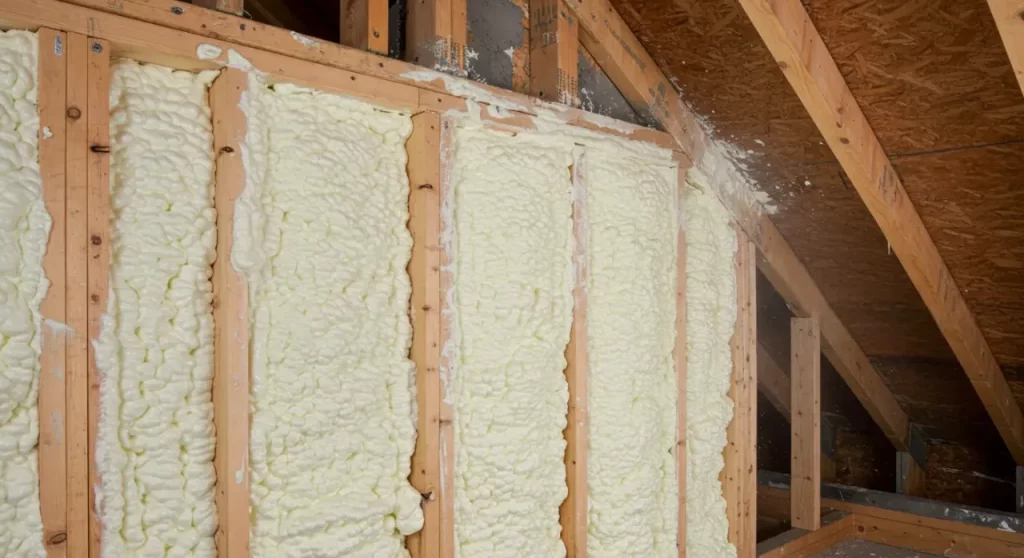Selling a house with spray foam insulation can be challenging for homeowners due to various factors, including complications with home inspections, financing issues, and misconceptions about the material. While spray foam insulation offers excellent energy efficiency and durability, potential buyers and lenders often hesitate due to concerns about improper installation, trapped moisture, and ventilation problems. Understanding these challenges can help homeowners navigate the real estate market effectively.
The Challenges of Selling a House with Spray Foam Insulation
1. Mortgage and Financing Issues
Many lenders hesitate to approve mortgages for homes with spray foam insulation. This is primarily due to:
- Structural Concerns: Spray foam can bond tightly to surfaces, making it difficult for inspectors to assess potential hidden damage.
- Appraisal Difficulties: If an appraiser cannot verify the condition of the structure behind the insulation, they may assign a lower value to the home.
- Limited Lender Options: Some mortgage providers require additional inspections or refuse loans for properties with spray foam insulation.
2. Inspection and Structural Assessment Difficulties
Home inspectors often struggle to evaluate properties with spray foam insulation due to:
- Obstructed View of Key Components: Spray foam covers key structural elements, making it difficult to inspect wiring, plumbing, and framing.
- Potential for Hidden Moisture Damage: If improperly installed, spray foam can trap moisture, leading to wood rot and mold growth.
- Difficulty Identifying Installation Errors: Poorly applied spray foam can cause long-term problems such as cracking and detachment from surfaces.
3. Ventilation and Airflow Concerns
Airtight insulation can create challenges for air circulation, leading to:
- Moisture Accumulation: Without proper ventilation, humidity levels may rise, increasing the risk of mold.
- Over-reliance on HVAC Systems: Homes with spray foam insulation often require mechanical ventilation systems to maintain air quality.
- Perceived Indoor Air Quality Issues: Buyers may worry about off-gassing from certain spray foam products, although modern formulations have improved safety standards.
4. Buyer Hesitation and Market Perception
Potential buyers may hesitate to purchase a home with spray foam insulation due to:
- Lack of Knowledge: Many buyers are unfamiliar with the benefits and potential issues of spray foam insulation.
- Negative Publicity: Some online reports and news stories have highlighted cases where poor installation led to serious structural damage.
- Fear of Costly Repairs: If an inspection reveals issues related to the insulation, buyers may negotiate for lower prices or back out of the sale.
5. Insurance Complications
Home insurance companies may charge higher premiums or deny coverage for homes with spray foam insulation due to:
- Risk of Fire Hazards: Some insurers consider spray foam insulation a fire risk if improperly installed near electrical components.
- Limited Policy Options: Some policies exclude coverage for issues related to improperly applied insulation.
- Difficulty in Damage Assessment: Since spray foam adheres tightly to surfaces, assessing damage can be costly and time-consuming.
Addressing Common Concerns When Selling a Home with Spray Foam Insulation
1. Providing Documentation and Certification
- Ensure that installation is performed by a certified professional.
- Keep records of installation warranties, product specifications, and compliance with industry standards.
- Obtain an inspection report from a licensed professional to reassure buyers.
2. Pre-Sale Home Inspection and Repairs
- Conduct a pre-sale home inspection to identify any potential issues related to insulation.
- Address any ventilation concerns by installing additional airflow systems if necessary.
- Repair any minor defects in insulation, such as cracks or gaps.
3. Educating Potential Buyers
- Highlight the benefits of spray foam insulation, including energy efficiency and soundproofing.
- Provide information on maintenance and proper ventilation solutions.
- Offer incentives, such as covering the cost of an additional inspection, to ease buyer concerns.
4. Working with Lenders and Insurers
- Find mortgage providers familiar with spray foam insulation to increase financing options for buyers.
- Compare different insurance policies to ensure coverage is available for potential buyers.
- Obtain a professional evaluation to confirm the insulation does not pose structural risks.
Conclusion
Selling a home with spray foam insulation in Dallas, TX, presents unique challenges, including financing hurdles, inspection difficulties, and buyer hesitation. However, homeowners can improve their chances of a successful sale by ensuring proper documentation, addressing ventilation concerns, and educating buyers about the benefits of spray foam insulation. By taking proactive steps, sellers can navigate the real estate market more effectively.
Contact Us
For expert advice on spray foam insulation and how it affects home value, Contact Dallas FFM Spray Foam Insulation today.
Frequently Asked Questions
Does spray foam insulation reduce home value?
Spray foam insulation can increase a home’s value due to energy efficiency, but improper installation or lack of documentation may lead to lower appraisals.
Can home buyers get a mortgage for a house with spray foam insulation?
Yes, but some lenders may require additional inspections to assess structural integrity before approving a mortgage.
Is spray foam insulation safe for home interiors?
When installed correctly by professionals, modern spray foam insulation is safe and does not emit harmful gases.
How can homeowners improve their chances of selling a house with spray foam insulation?
Providing documentation, conducting pre-sale inspections, and educating buyers about insulation benefits can help overcome selling challenges.
Why do insurance companies hesitate to cover homes with spray foam insulation?
Insurance providers may have concerns about hidden structural damage, fire risks, and moisture-related issues associated with spray foam insulation.



